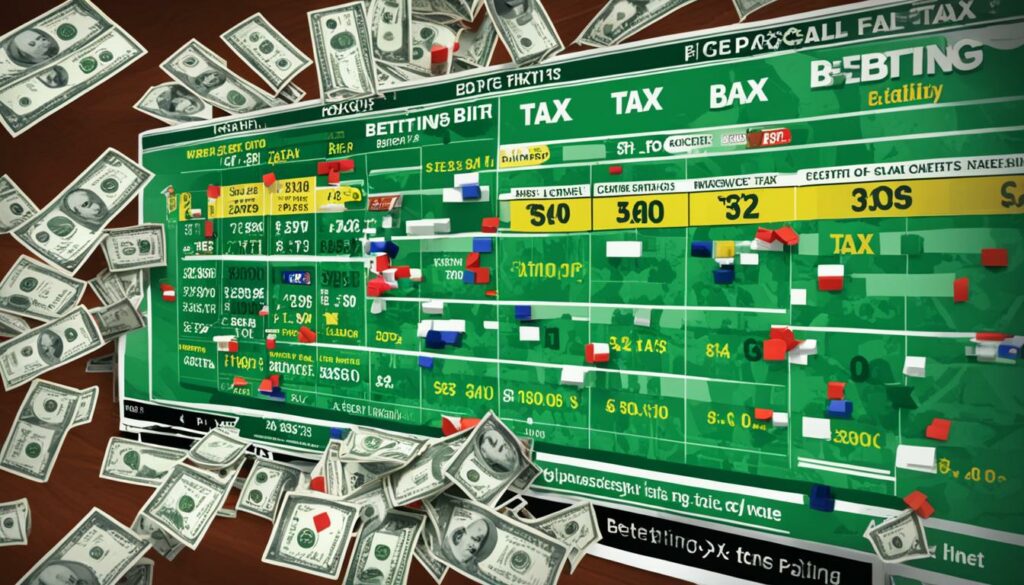Welcome to our comprehensive guide on betting tax rates! Whether you’re a seasoned gambler or just getting started, understanding how much tax you may owe on your bets is essential. In this guide, we will explore the various tax rates associated with betting and help you gain a better understanding of the regulations and legislation surrounding gambling.
As you may be aware, betting tax rates can vary depending on a range of factors. Some types of bets may be subject to direct taxes on winnings, while others may be subject to indirect taxes on stakes and revenue. That’s why it’s important to know how to calculate your betting tax liability accurately.
Don’t worry if you’re feeling overwhelmed; our guide is here to help you navigate the complexities of betting tax. We’ll provide an overview of the concept of betting tax, discuss the different types of tax rates that can apply, and guide you through the process of calculating your tax liability. So let’s get started!
Overview of Betting Tax
Betting tax, also known as tax on gambling, is a levy imposed on the stakes and earnings of an individual or a betting operator from a gambling activity. The tax applies to different types of gambling activities, including sports betting, casino games, horse racing, and lotteries.
The general principle behind taxing betting is to generate revenue for the government and regulate the gambling industry. The tax rates can vary depending on several factors, such as the type of gambling activity, the location of the betting operator or individual, and the tax laws and regulations.
Understanding the concept of betting tax is essential for staying informed and making informed decisions when it comes to gambling. Additionally, being aware of the tax regulations and legislation surrounding betting tax is crucial to staying compliant and avoiding any potential legal and financial penalties.
Betting Tax and Gambling Activities
Betting tax can differ based on the type of gambling activity. For instance, sports betting tax can be levied on individual betting transactions or as a percentage of the operator’s revenue. Likewise, casino game tax can be imposed on the operator’s revenue or winnings from slot machines.
Similarly, tax on horse racing can be based on the gross receipts or wagers made at off-track betting locations. Lotteries can also be subject to tax, with the winnings or the earnings from ticket sales taxable.
Factors Affecting Betting Tax Rates
The tax rates for betting can vary depending on various factors. Some of the factors that can impact betting tax rates include the location of the individual or the betting operator, the type of gambling activity, and the tax laws and regulations of a particular jurisdiction.
For instance, in some countries, tax rates for sports betting can be higher compared to casino game tax rates. Similarly, in some states in the US, betting operators need to pay a certain percentage of their revenue as tax, while in others, they pay a flat rate.
Different Types of Betting Tax Rates
When it comes to betting and taxes, there are different types of tax rates to consider. This section will help you understand the key types of taxes associated with betting and how they can impact your betting activities.
Direct Taxes on Winnings
Direct taxes on winnings are taxes that are imposed on any income that you generate from your betting activities. These taxes are usually calculated as a percentage of your winnings and are paid directly to the tax authorities. The percentage of tax can vary depending on your country of residence, the type of betting activity and the amount of money won. It’s essential to understand the direct taxes on winnings to accurately calculate your tax liability.
Indirect Taxes on Stakes and Revenue
There are also indirect taxes on stakes and revenue associated with betting. These taxes are typically paid by bookmakers on the revenue earned from their betting activities. In some cases, the tax is passed on to the punter in the form of increased betting odds or a reduced payout. It’s important to note the indirect taxes on stakes and revenue to ensure you’re getting a fair deal from your bookmaker.
To better illustrate the differences between the direct and indirect taxes, we have created a table detailing the key features of each type of tax.
Type of Tax Description Examples Direct Taxes on Winnings Taxes imposed directly on your winnings Income tax, gambling tax, withholding tax Indirect Taxes on Stakes and Revenue Taxes imposed on betting operators and potentially passed onto the punter through betting odds or payout reductions Point of consumption tax, gross profit tax
Understanding the difference between direct and indirect taxes is crucial for accurately calculating your tax liability and getting a fair deal as a punter.
Follow good fun88 news at https://replit.com/@fun888pro
Calculating Your Betting Tax
Calculating your betting tax obligation can be a confusing and complicated process, especially if you’re not familiar with the different types of taxes that can apply to gambling. Fortunately, there are resources available to help you calculate your tax liability accurately.
One such resource is a betting tax calculator, which can provide you with an estimate of your tax liability based on the specific details of your bets. These calculators consider variables like your total winnings or losses, type of betting activity, and jurisdiction to help you determine how much tax you may owe.

It’s essential to note that betting tax calculations can be complicated, and so, it’s advisable to consult with a tax professional to help you calculate your tax liability accurately. Tax professionals can provide you with expert advice or assistance in filing your taxes and ensuring compliance with relevant regulations and legislation.
Betting Tax Legislation and Regulations
When it comes to betting taxes, there are specific legislations and regulations in place to protect both the bettor and the betting operator. Understanding these legal obligations is essential for staying compliant and avoiding potential penalties.
In the US, the federal government does not have a specific betting tax, leaving each state to determine its own betting tax legislation. While some states have implemented no betting tax regulations, others require a percentage of the bettor’s winnings to be withheld as tax or a percentage of the operator’s revenue to be paid as tax.
For example, in Nevada, bettors are required to pay a 6.75% tax on winnings exceeding $1,200, while in New Jersey, there is no tax on winnings for casual bettors, but professional bettors are subject to a 13% tax on their earnings. Similarly, in Pennsylvania, there is a 36% tax on the operator’s revenue.
It is important for both bettors and betting operators to familiarize themselves with the specific betting tax legislation and regulations in their state or location to ensure compliance.
“The legal obligations governing betting tax regulations aim to promote transparency, protect consumers, and ensure fair practices within the industry.”
Legal Responsibilities for Betters and Operators
Bettors are responsible for reporting their winnings accurately on their annual tax returns and paying any taxes owed to the state or federal government. Failure to do so can result in penalties, such as fines or legal action.
Betting operators, on the other hand, are responsible for withholding and paying the relevant taxes on behalf of their customers, as well as reporting their revenue to the appropriate tax authorities. Failure to comply with betting tax regulations can result in severe penalties, such as hefty fines or even the revocation of their betting license.
Factors Affecting Betting Tax Rates
The amount of tax you may owe on your bets can depend on several factors. Understanding these factors can help you anticipate the amount of tax you may need to pay. Below are some of the key factors that impact betting tax rates:
| Factor | Description |
|---|---|
| Type of Gambling Activity | The type of gambling activity can significantly affect the tax rates. Some activities, such as sports betting or horse racing, may have different tax rates than casino or lottery games. Check with relevant authorities to determine which activities are subject to different tax rates. |
| Location | The country or state in which you are placing your bet can also affect the tax rates. Some jurisdictions may have no betting tax, while others may have high tax rates. It is important to research the tax regulations in the location where you are gambling. |
| Individual Circumstances | Your own circumstances, such as your income and tax bracket, can impact the amount of tax you owe on your bets. For instance, if you are a high-earner, you may be subject to higher tax rates on your bets. Consult a tax professional for advice on how your individual circumstances may affect your betting tax liability. |
By understanding these factors, you can get a better idea of how much tax you may owe on your bets. It is always important to stay informed about the betting tax rates and regulations to ensure that you remain compliant and avoid any potential penalties.

Conclusion
In conclusion, understanding the tax rates and regulations associated with betting is essential for anyone involved in gambling activities. Whether you are a professional gambler or an occasional bettor, staying informed about your tax liabilities can help you avoid potential penalties and fines.
By exploring the different types of betting tax rates, calculating your tax liability, and understanding the legislation and regulations, you can make informed decisions when it comes to gambling. Utilizing resources such as betting tax calculators can also help simplify the process and ensure accuracy in your calculations.
Remember to take into account the various factors that can impact your betting tax rates, such as the type of gambling activity, location, and personal circumstances. By staying informed and compliant with the relevant legislation, you can enjoy your gambling activities with peace of mind.
Thank you for taking the time to read this comprehensive guide on betting tax rates. We hope that it has provided you with the necessary information to make informed decisions when it comes to your tax liabilities.
FAQ
What are the different types of betting tax rates?
There are primarily two types of betting tax rates – direct taxes on winnings and indirect taxes on stakes and revenue. Direct taxes are typically a percentage of your gambling winnings, while indirect taxes can vary based on factors such as the type of gambling activity and the jurisdiction you are in.
How do I calculate my betting tax liability?
Calculating your betting tax liability can be done using various methods and tools. One way is to use a betting tax calculator, which takes into account your gambling winnings, stakes, and other relevant factors to determine how much tax you may owe. It is important to keep accurate records of your bets and seek professional advice if needed.
What legislation and regulations govern betting tax?
Betting tax legislation and regulations vary from jurisdiction to jurisdiction. It is important to familiarize yourself with the specific laws and regulations in your location to ensure compliance. These regulations outline the legal obligations for both gamblers and betting operators, including reporting requirements and payment deadlines.
What factors can affect betting tax rates?
Several factors can impact betting tax rates. The type of gambling activity, such as sports betting or casino games, can affect the tax you owe. Additionally, your location may have specific tax laws that determine the rate. Individual circumstances, such as your total income and tax bracket, can also play a role in determining your betting tax liability.
Why is understanding betting tax rates important?
Understanding betting tax rates is crucial for staying informed and compliant with the law. Failing to comply with tax regulations can result in penalties or legal consequences. By knowing how much tax you may owe and following the appropriate legislation, you can ensure that you meet your tax obligations and avoid any unnecessary risks.











Got a Questions?
Find us on Socials or Contact us and we’ll get back to you as soon as possible.